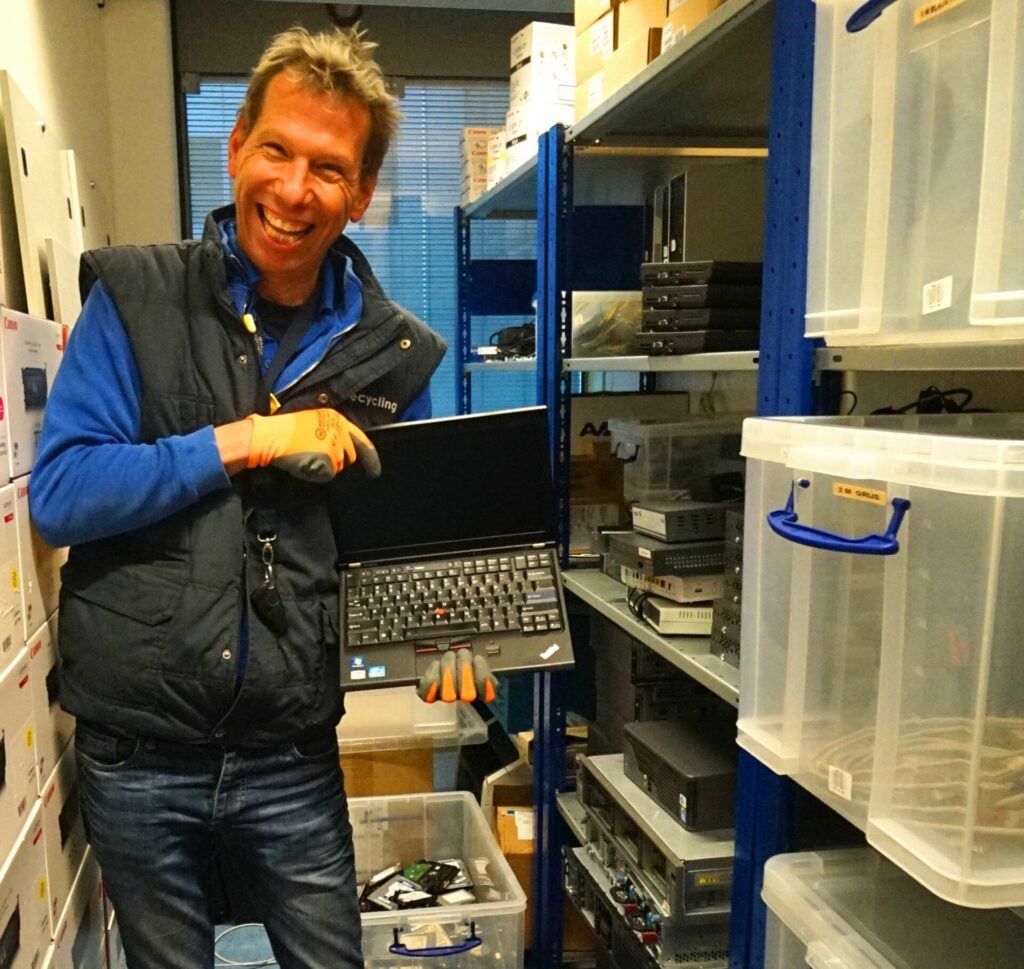Computer recycling and environment : legal obligations
For a long time, you – as a business – have not been allowed to just throw old computer hardware away with the garbage. You have to have your discarded and old computer recycled. This is well regulated by law these days.
For those companies that have discarded computers and computer waste for recycling, the rules have been made very simple: You must partner with an IT Recycling company that meets the WEEELABEX standard. For this, such an IT Recycling company is then WEEELABEX certified.
Read more here : certification and weeelabex.
The WEEELABEX standard is a very strict environmental and quality standard for recycling computers. Only the very best IT recycling companies meet this standard and there are a lot of amateur companies around the country that collect old computers for recycling without WEEELABEX. This is not the way to go. Before you pick up old computers for recycling, check if they have a WEEELABEX at www.weeelabex.org.
Recycling laptops is slightly different after all
This blog is about laptops and computers. Laptop recycling is something special in recycling land. In itself, laptops are excellent to recycle but there are some things that are definitively different in laptop recycling. I have written a special blog about laptop recycling here. Read blog : laptop recycling
Data destruction and hard drive destruction.
There is a hard drive in every computer and laptop, that’s obvious. This hard drive stores confidential data of the users and the organization when worked with. This happens in every computer and every laptop from day one of working with it. Now you can say, no, ours worked in the cloud or was on a network, still you have to be careful. Surely every computer stores all sorts of things in the background that could cause big problems if they get into the hands of cyber criminals. I’m just thinking: browsing history, cookies, passwords in brewers, self-filling brewers, recovered documents within office, internet and network settings, things from social media and so on.

My urgent advice is: when you have old laptops and old computers collected for recycling: always make sure that your data destruction is done completely properly. You can do it yourself with free tools from the Internet like Dban, for example, or your system administrator can do it. But if it is not your daily work then it is hugely time-consuming and you have to wait and see if everything works and goes well with that data destruction. If you let the professional do it it will only cost you a few euros per disk. The professional uses a professional tool for the destruction of hard drives, for example, we use Certus wipe software.
The better companies often also have a hard disk shredder with which they can destroy hard disks at lightning speed. You also get a certificate. With us at IT Recycling, you also get a list of the serial numbers of the hard drives, a data waiver and an environmental certificate! But that is not standard when you ask an IT recycling company to destroy the data, usually you only have a certificate.
Be careful if you have ISO27001, 9001 or 14001 because your auditor will not agree to this. It’s better to ask for a sample of the documents you get with data destruction before you engage with someone. The previously discussed weeelabex standard is also about data destruction but this standard says little about the evidence that the client receives after data destruction. So ask first and check carefully if your auditor thinks it is good enough. If you want to know what data destruction costs, click here for our current price list: Data destruction prices.
Data destruction not just for hard drives
Data destruction has now really become a profession. First, of course, it started somewhere in the early 1990s with hard drive destruction. But now we know that there are many more devices that contain sensitive data. The reason I bring this up is because very often these things come along when we pick up old laptops and computers for recycling.
We often then suddenly see boxes of CDs and DVDs coming out of a corner, or old cell phones. This blog is definitely not about all types of data carriers and how to destroy them, but I would definitely recommend that you really take it into account when you have old hardware disposed of by an IT Recycling company.

